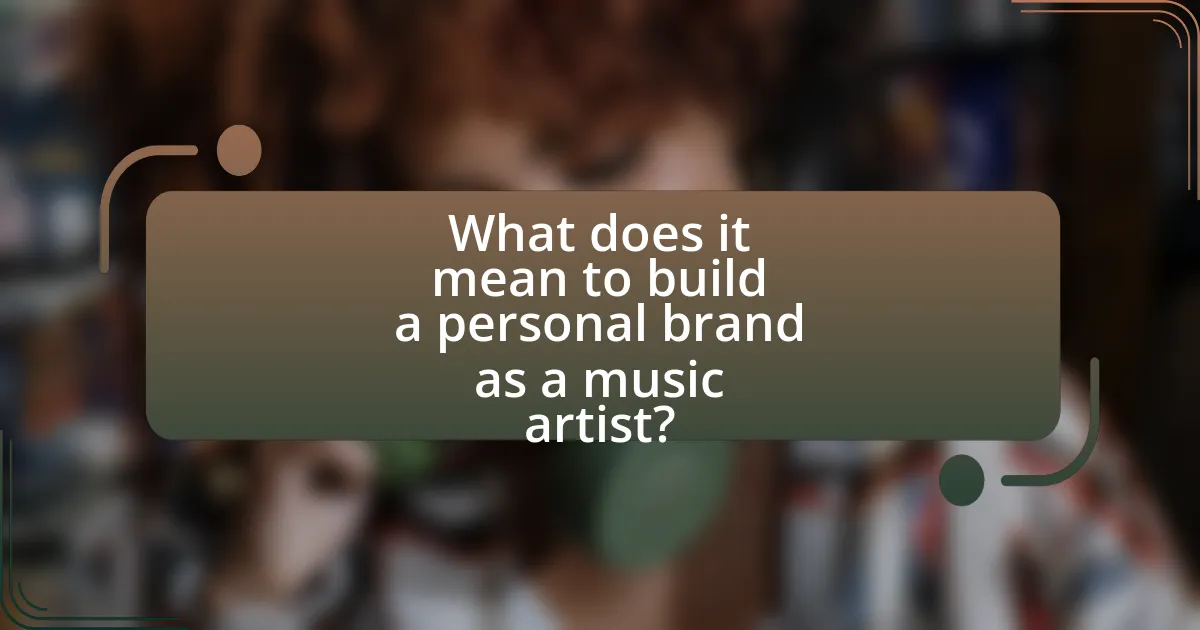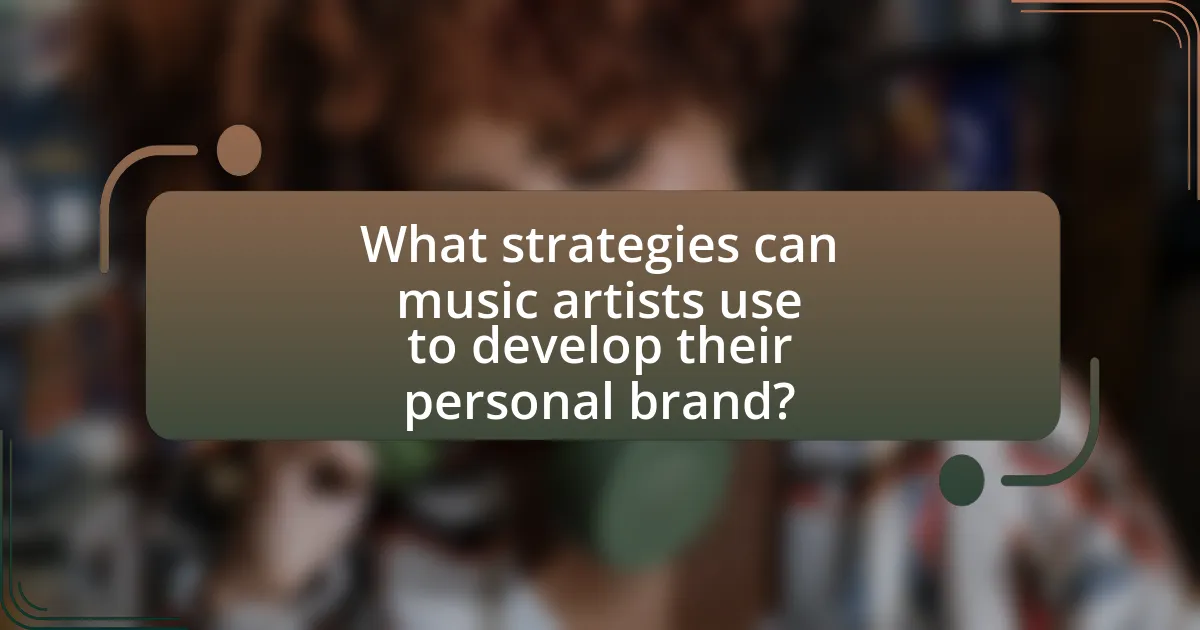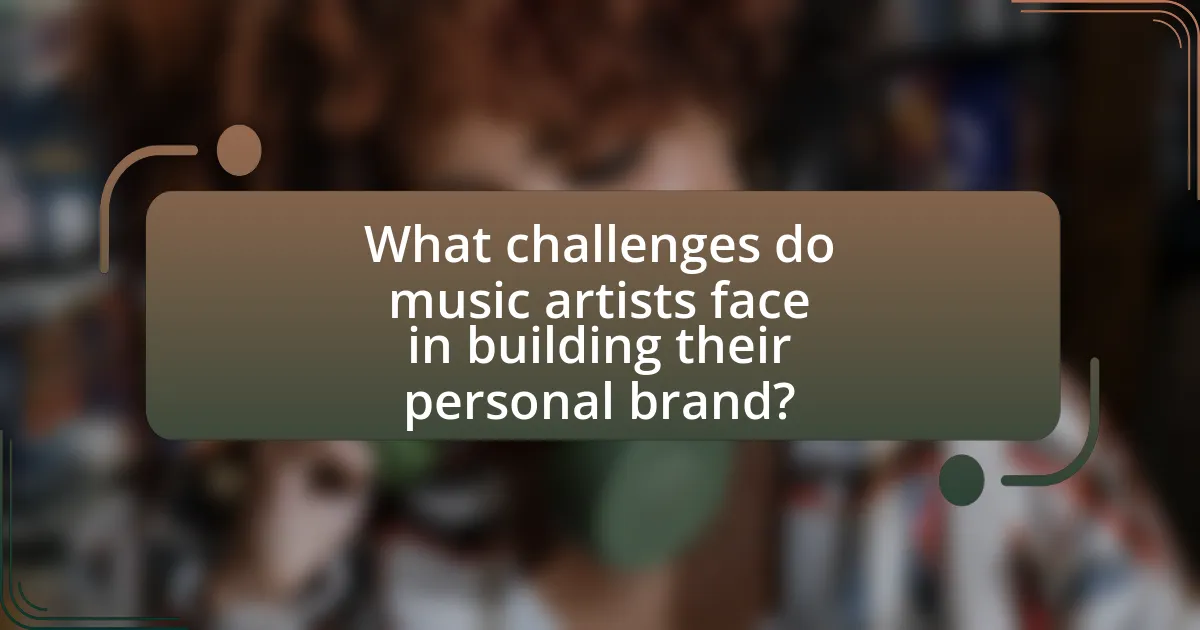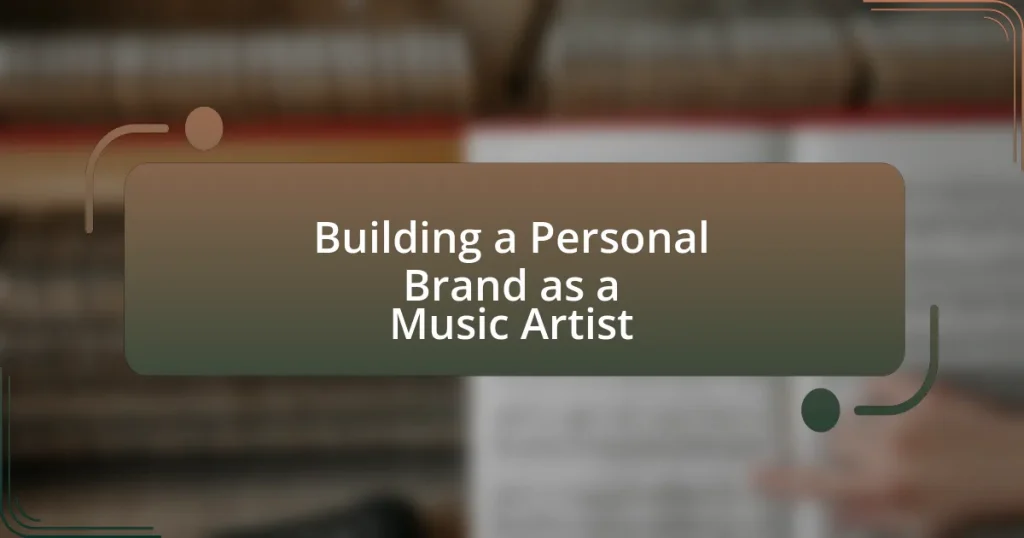Building a personal brand as a music artist involves creating a distinctive identity that sets the artist apart in the competitive music industry. This process includes defining the artist’s style, values, and messaging to resonate with their target audience, ultimately enhancing visibility and fostering emotional connections with fans. Key elements of personal branding include authenticity, visual identity, audience engagement, and consistent messaging, all of which contribute to an artist’s marketability and success. The article also explores the importance of storytelling, social media engagement, and networking strategies, while addressing challenges artists face in maintaining their brand integrity and overcoming negative perceptions.

What does it mean to build a personal brand as a music artist?
Building a personal brand as a music artist means creating a unique identity that distinguishes the artist in the music industry. This involves defining the artist’s style, values, and message, which resonate with their target audience. A strong personal brand helps artists connect emotionally with fans, enhances their visibility, and can lead to increased opportunities for collaborations, performances, and sales. For instance, artists like Taylor Swift and Beyoncé have successfully built personal brands that reflect their artistic vision and personal narratives, resulting in loyal fan bases and significant commercial success.
Why is personal branding important for music artists?
Personal branding is crucial for music artists because it helps them establish a unique identity that resonates with their audience. A strong personal brand differentiates artists in a saturated market, allowing them to connect emotionally with fans and build a loyal following. According to a study by the University of Southern California, artists with a well-defined personal brand are 30% more likely to achieve commercial success compared to those without one. This branding not only enhances visibility but also opens up opportunities for collaborations, sponsorships, and increased revenue streams.
How does personal branding influence a music artist’s career?
Personal branding significantly influences a music artist’s career by shaping their public image and connecting them with their audience. A strong personal brand helps artists differentiate themselves in a competitive industry, allowing them to cultivate a loyal fan base and attract opportunities such as collaborations, sponsorships, and media exposure. For instance, artists like Beyoncé and Taylor Swift have effectively utilized personal branding to enhance their marketability, resulting in multi-million dollar endorsements and sold-out tours. This demonstrates that a well-defined personal brand can lead to increased visibility and financial success in the music industry.
What role does authenticity play in a music artist’s brand?
Authenticity is crucial in a music artist’s brand as it fosters trust and connection with the audience. When artists present themselves genuinely, they resonate more deeply with fans, leading to increased loyalty and engagement. Research indicates that 86% of consumers consider authenticity important when deciding which brands to support, highlighting its significance in the music industry as well. For instance, artists like Taylor Swift and Ed Sheeran have built their brands on personal storytelling and relatable experiences, which enhances their authenticity and strengthens their fan base.
What are the key elements of a personal brand for music artists?
The key elements of a personal brand for music artists include authenticity, visual identity, audience engagement, and consistent messaging. Authenticity allows artists to connect genuinely with their audience, fostering trust and loyalty. Visual identity encompasses logos, color schemes, and overall aesthetics that represent the artist’s style and genre, making them recognizable. Audience engagement involves actively interacting with fans through social media, live performances, and other platforms, which strengthens community ties. Consistent messaging ensures that the artist’s values, mission, and artistic vision are clearly communicated across all channels, reinforcing their brand identity. These elements collectively contribute to a strong and memorable personal brand in the music industry.
How do visuals contribute to a music artist’s brand identity?
Visuals significantly contribute to a music artist’s brand identity by creating a recognizable aesthetic that resonates with their target audience. This aesthetic includes elements such as album artwork, music videos, social media imagery, and stage design, which collectively communicate the artist’s style, values, and message. For instance, artists like Billie Eilish utilize distinct color palettes and visual themes that reflect their music’s emotional tone, enhancing audience connection and brand recall. Research indicates that consistent visual branding can increase audience engagement by up to 23%, demonstrating the effectiveness of visuals in solidifying an artist’s identity in a competitive market.
What messaging strategies should music artists use to convey their brand?
Music artists should utilize storytelling, social media engagement, and consistent visual branding as key messaging strategies to effectively convey their brand. Storytelling allows artists to connect emotionally with their audience, sharing personal experiences and inspirations that resonate with fans. Social media engagement enables artists to interact directly with their audience, fostering a sense of community and loyalty. Consistent visual branding, including logos, color schemes, and imagery, helps create a recognizable identity that distinguishes the artist in a crowded market. These strategies are supported by research indicating that emotional connections and consistent branding significantly enhance audience engagement and brand loyalty in the music industry.
How can music artists effectively communicate their personal brand?
Music artists can effectively communicate their personal brand by consistently showcasing their unique identity through various channels such as social media, music videos, and live performances. This approach allows artists to create a cohesive narrative that resonates with their audience. For instance, artists like Billie Eilish have successfully used platforms like Instagram to share personal insights and visual aesthetics that align with their music style, reinforcing their brand identity. Additionally, engaging storytelling in lyrics and public appearances helps to establish a deeper connection with fans, making the brand more relatable and memorable.
What platforms are best for promoting a music artist’s brand?
Social media platforms such as Instagram, TikTok, and Facebook are best for promoting a music artist’s brand. These platforms allow artists to engage directly with fans, share content, and build a community around their music. For instance, TikTok has become a significant driver of music discovery, with songs going viral and leading to increased streams and downloads. According to a report by the Recording Industry Association of America, social media plays a crucial role in music marketing, with 70% of consumers discovering new music through these channels. Additionally, Instagram’s visual focus enables artists to showcase their personality and brand aesthetics, further enhancing their reach and engagement.
How can storytelling enhance a music artist’s brand communication?
Storytelling enhances a music artist’s brand communication by creating emotional connections with audiences, which fosters loyalty and engagement. When artists share personal narratives or experiences through their music and marketing, they humanize their brand, making it relatable. For instance, artists like Taylor Swift have effectively used storytelling in their lyrics and public persona to convey their life experiences, which resonates with fans and strengthens their brand identity. This approach not only differentiates them in a crowded market but also encourages deeper fan interactions, as evidenced by increased social media engagement and concert attendance linked to storytelling elements in their work.

What strategies can music artists use to develop their personal brand?
Music artists can develop their personal brand by creating a unique identity that resonates with their target audience. This involves defining their musical style, visual aesthetics, and messaging to ensure consistency across all platforms. For instance, artists like Billie Eilish have successfully branded themselves through distinctive fashion choices and relatable lyrics, which have contributed to a strong fan connection. Additionally, engaging with fans through social media platforms, such as Instagram and TikTok, allows artists to showcase their personality and build a community. According to a study by the Berklee College of Music, artists who actively engage with their audience online see a 30% increase in fan loyalty. Furthermore, collaborating with other artists and brands can enhance visibility and credibility, as seen with collaborations like Ed Sheeran and Justin Bieber, which broaden their reach. Overall, a strategic approach to branding that includes identity creation, fan engagement, and collaborations can significantly enhance a music artist’s personal brand.
How can music artists leverage social media for branding?
Music artists can leverage social media for branding by creating engaging content that showcases their personality, music, and values. By consistently posting behind-the-scenes footage, live performances, and personal stories, artists can build a strong connection with their audience. For instance, a study by the Pew Research Center found that 72% of teenagers use Instagram, making it an effective platform for artists to reach younger demographics. Additionally, artists can utilize targeted advertising on platforms like Facebook and Instagram to promote their music and merchandise, increasing visibility and engagement. Collaborating with influencers and other artists can also enhance their reach, as partnerships often introduce them to new audiences.
What types of content should music artists share on social media?
Music artists should share a variety of content on social media, including behind-the-scenes footage, music releases, live performances, personal stories, and fan interactions. Behind-the-scenes content allows fans to connect with the artist’s creative process, while music releases keep the audience updated on new material. Live performances can be shared through streaming or clips, showcasing the artist’s talent and engaging fans in real-time. Personal stories humanize the artist, fostering a deeper connection with the audience. Additionally, interacting with fans through comments, Q&A sessions, or reposting fan content builds community and loyalty. These content types are effective in enhancing an artist’s personal brand and maintaining audience engagement.
How can engagement with fans strengthen a music artist’s brand?
Engagement with fans strengthens a music artist’s brand by fostering loyalty and creating a sense of community. When artists interact with their audience through social media, live performances, and fan events, they build personal connections that enhance emotional investment in their music. According to a study by the University of Southern California, artists who actively engage with fans see a 30% increase in fan retention and a 25% increase in merchandise sales. This direct interaction not only amplifies the artist’s visibility but also cultivates a dedicated fan base that advocates for the artist, further solidifying their brand in the competitive music industry.
What role does networking play in building a personal brand?
Networking is essential in building a personal brand as it facilitates connections with industry professionals, influencers, and potential fans. These connections can lead to opportunities such as collaborations, performances, and exposure to wider audiences. For instance, a study by LinkedIn found that 85% of jobs are filled through networking, highlighting its importance in career advancement, which directly applies to music artists seeking to establish their brand. By engaging with others in the industry, artists can enhance their visibility, credibility, and reputation, ultimately strengthening their personal brand.
How can collaborations with other artists enhance a music artist’s brand?
Collaborations with other artists can significantly enhance a music artist’s brand by expanding their audience reach and increasing credibility. When a music artist collaborates with another established artist, they tap into that artist’s fan base, which can lead to increased exposure and new listeners. For instance, the collaboration between Ed Sheeran and Justin Bieber on the song “I Don’t Care” resulted in over 1 billion streams on Spotify, showcasing how partnerships can lead to massive audience growth. Additionally, collaborations often bring diverse creative influences, allowing artists to innovate and differentiate their sound, which can strengthen their brand identity. This blending of styles can attract attention from media outlets and industry professionals, further solidifying the artist’s reputation in the music industry.
What networking strategies should music artists adopt?
Music artists should adopt strategies such as leveraging social media platforms, attending industry events, collaborating with other artists, and engaging with fans to build their networks. Social media platforms like Instagram and TikTok allow artists to showcase their work and connect with a broader audience, which is essential in today’s digital landscape. Attending industry events, such as music festivals and conferences, provides opportunities for face-to-face networking with industry professionals and peers. Collaborating with other artists can lead to cross-promotion and access to new fan bases, enhancing visibility. Engaging with fans through live performances and interactive content fosters loyalty and community, which are vital for long-term success in the music industry.
How can music artists measure the effectiveness of their branding efforts?
Music artists can measure the effectiveness of their branding efforts through metrics such as social media engagement, streaming statistics, and merchandise sales. Social media engagement, including likes, shares, and comments, provides insight into audience interaction and brand resonance. Streaming statistics from platforms like Spotify and Apple Music reveal listener growth and popularity trends, indicating how well the brand is being received. Additionally, merchandise sales serve as a direct financial indicator of brand loyalty and recognition among fans. These metrics collectively offer a comprehensive view of branding effectiveness, allowing artists to adjust their strategies based on data-driven insights.
What metrics should music artists track to assess brand growth?
Music artists should track metrics such as social media engagement, streaming numbers, merchandise sales, and audience demographics to assess brand growth. Social media engagement, measured through likes, shares, and comments, indicates how well an artist connects with their audience. Streaming numbers from platforms like Spotify and Apple Music reflect the popularity and reach of an artist’s music. Merchandise sales provide insight into the financial success and brand loyalty of fans. Audience demographics, including age, location, and gender, help artists tailor their marketing strategies effectively. Collectively, these metrics offer a comprehensive view of an artist’s brand growth and market presence.
How can feedback from fans inform a music artist’s branding strategy?
Feedback from fans can significantly inform a music artist’s branding strategy by providing insights into audience preferences and perceptions. This feedback can be gathered through social media interactions, surveys, and live performances, allowing artists to understand what resonates with their audience. For instance, a study by Nielsen Music found that 56% of fans feel more connected to artists who engage with them online, indicating that direct fan feedback can shape an artist’s public image and marketing efforts. By analyzing this feedback, artists can tailor their music, visuals, and overall brand messaging to align with fan expectations, ultimately enhancing their marketability and fostering a loyal fanbase.

What challenges do music artists face in building their personal brand?
Music artists face several challenges in building their personal brand, including market saturation, audience engagement, and maintaining authenticity. The music industry is highly competitive, with thousands of artists vying for attention, making it difficult for individual musicians to stand out. Additionally, engaging with audiences through social media and live performances requires consistent effort and creativity, which can be overwhelming. Maintaining authenticity is crucial, as artists must balance commercial success with staying true to their artistic vision, which can lead to conflicts in brand identity. These challenges are supported by industry reports indicating that over 60% of new artists struggle to gain visibility in a crowded market.
How can music artists overcome negative perceptions in their branding?
Music artists can overcome negative perceptions in their branding by actively engaging with their audience and addressing misconceptions directly. This approach includes transparent communication through social media, where artists can clarify their intentions and share personal stories that resonate with fans. For instance, artists like Taylor Swift have successfully navigated negative press by openly discussing their experiences and evolving their public image, which has led to a stronger connection with their audience. Additionally, collaborating with reputable brands or influencers can help reshape public perception by associating the artist with positive attributes. Research shows that consistent positive engagement can significantly improve brand perception, as seen in studies by the Journal of Marketing Research, which highlight the impact of authenticity and relatability in brand recovery.
What strategies can help music artists manage public relations crises?
Music artists can manage public relations crises by implementing proactive communication strategies, establishing a crisis management plan, and engaging with their audience transparently. Proactive communication involves regularly updating fans and stakeholders about the artist’s activities and values, which builds trust and mitigates backlash during crises. A well-defined crisis management plan outlines specific steps to take when a crisis arises, including identifying key messages, designating spokespersons, and determining communication channels. Engaging transparently with the audience during a crisis, such as addressing concerns directly through social media or press releases, helps to maintain credibility and demonstrates accountability. For instance, when Taylor Swift faced public scrutiny regarding her political stance, she addressed the issue directly through social media, which helped to clarify her position and regain public support.
How can music artists maintain consistency in their brand despite challenges?
Music artists can maintain consistency in their brand despite challenges by establishing a clear brand identity and adhering to it across all platforms. This involves defining their unique style, message, and values, which should remain constant even when facing external pressures such as changes in the music industry or personal circumstances. For instance, artists like Taylor Swift have successfully navigated various challenges by evolving their music while keeping their core themes of storytelling and authenticity intact. This approach not only reinforces their brand but also fosters a loyal fanbase that resonates with their consistent identity.
What are common pitfalls music artists should avoid in branding?
Common pitfalls music artists should avoid in branding include inconsistency in their image and messaging, neglecting audience engagement, and failing to differentiate themselves from competitors. Inconsistency can confuse fans and dilute brand identity; for example, an artist who frequently changes their style or public persona may struggle to maintain a loyal following. Neglecting audience engagement can lead to a disconnect, as artists who do not interact with their fans miss opportunities for building community and loyalty. Lastly, failing to differentiate can result in an artist being overlooked in a saturated market; unique branding elements, such as a distinctive sound or visual style, are crucial for standing out. These pitfalls can significantly hinder an artist’s ability to establish a strong and recognizable brand.
How can music artists ensure they stay true to their brand vision?
Music artists can ensure they stay true to their brand vision by consistently aligning their creative output, public persona, and business decisions with their core values and artistic identity. This alignment fosters authenticity, which is crucial for building a loyal fan base. For instance, artists like Taylor Swift have maintained their brand vision by evolving their music while staying true to themes of personal storytelling and empowerment, which resonate with their audience. Additionally, regular self-reflection and feedback from fans can help artists gauge whether their actions and releases align with their intended brand message, reinforcing their commitment to authenticity.
What mistakes can undermine a music artist’s personal brand?
Mistakes that can undermine a music artist’s personal brand include inconsistent messaging, lack of engagement with fans, and poor social media management. Inconsistent messaging can confuse audiences and dilute brand identity, as seen with artists who frequently change their musical style without clear communication. Lack of engagement with fans can lead to a disconnect, resulting in diminished loyalty; for instance, artists who do not respond to fan interactions on social media may lose their audience’s interest. Poor social media management, such as posting inappropriate content or failing to maintain a professional image, can damage an artist’s reputation, as evidenced by several high-profile cases where artists faced backlash for controversial posts.
What practical tips can music artists implement to enhance their personal brand?
Music artists can enhance their personal brand by consistently engaging with their audience through social media platforms. Regularly posting updates, behind-the-scenes content, and personal stories fosters a connection with fans, which is crucial for brand loyalty. According to a 2021 study by the International Music Summit, 70% of music consumers prefer artists who actively communicate with them online. Additionally, artists should develop a unique visual identity, including logos and consistent color schemes, to create a recognizable brand image. This approach is supported by research from the Nielsen Music report, which indicates that visual branding significantly influences consumer recognition and preference in the music industry. Lastly, collaborating with other artists and influencers can expand reach and introduce the artist to new audiences, as partnerships often lead to increased visibility and credibility.
How can music artists create a cohesive brand experience for their audience?
Music artists can create a cohesive brand experience for their audience by consistently aligning their music, visuals, messaging, and interactions across all platforms. This alignment ensures that fans receive a unified perception of the artist, which can enhance loyalty and engagement. For instance, artists like Taylor Swift and Beyoncé maintain a consistent aesthetic and thematic elements in their albums, music videos, and social media presence, reinforcing their brand identity. Research indicates that brands with a cohesive identity can increase customer loyalty by up to 23%, demonstrating the effectiveness of a unified approach in building a personal brand.
What best practices should music artists follow for effective branding?
Music artists should focus on creating a consistent and authentic brand identity to achieve effective branding. This involves defining a unique artistic vision, which includes a distinct sound, visual style, and personal narrative that resonates with their target audience. Consistency across all platforms, including social media, music releases, and merchandise, reinforces brand recognition and loyalty.
Additionally, engaging with fans through interactive content and live performances fosters a deeper connection, enhancing brand loyalty. According to a study by Nielsen Music, 70% of fans are more likely to support artists who actively engage with them online. This statistic underscores the importance of building a community around the brand.
Finally, collaborating with other artists and brands can expand reach and introduce the artist to new audiences, further solidifying their brand presence in the music industry.
